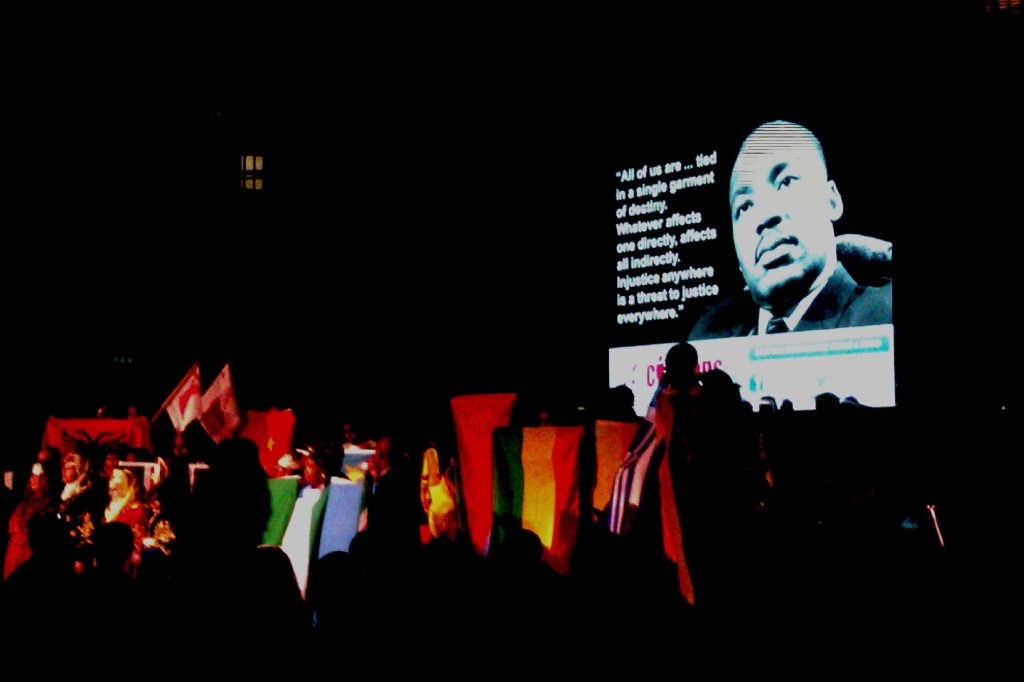Jellicoe intern and researcher Caitlin Burbridge reflects on the impact of the Olympics on its host boroughs, and highlights two exciting projects in which local churches are playing a leading role.
As London prepares for its ‘cultural Olympiad’, it seems fitting to look back on the history of the Olympics and reflect on the values that inspired this great modern phenomenon. Amidst the frenzy of the 2012 Olympic preparations, one can’t help but be aware of an ‘elephant in the room’. A recent talk by Jeremy Hunt MP, Secretary of State for Culture, Olympics, Media and Sport, revealed the new ‘GREAT’ campaign, which seeks to promote the British nation as a tourist hub for 2012, capturing the economic potential of becoming an international centre for culture and excellence, not least through the branding of a full subway carriage in New York with the GREAT Britain logo. The bravado of culture, art and sport seems to mask the distance between the rhetoric of regeneration and the lived experience of local people. Analysis of two grassroots initiatives reveals how civil society has been responsible for beginning to deconstruct the barriers between national and local society that such large scale events create. This process has opened up space for creative thinking about the benefits that events such as the Olympics might have for both spheres of life.
Now I’m excited about opportunities to engage with the Olympics – the prospect of ‘hidden London’ holds particular interest, given my love of all things spontaneous. However, an analysis of the original values of the Olympics makes the rather bland gloss of London 2012 increasingly apparent.
David Harvey coined the term ‘glocalisation’ to explain the relationship between global and local spheres of society. The idea of the local as a product of international processes is particularly prevalent to this discussion. To what extent does the unfulfilled rhetoric of Olympic activity, which claims ‘regeneration and the knitting together of the fabric of our society’, actually further alienate the local from the national?
Pierre de Coubertin is recognised as the founder of the modern Olympic games. His motivation for the games is argued to have been a combination of promoting hardwork and excellence by bringing together the best athletes from all around the world, instilling a sense of national pride, and encouraging the cooperation of people to promote peace and prevent conflict (McNamara, 2012). It is these values which reflect a more enriched vision of the Olympics; an opportunity for people, and the development of the communities within which we live,
around the ideals of communication, relationship and hardwork as the expression of human potential. This vision is encouraging because it presents ideals which local society can actively engage with, as opposed to the somewhat deceptive narrative of the 2012 games which preaches ‘regeneration’ on the narrow basis of economic benefit.
For TELCO ‘The East London Communities Organisation’, LOCOG’s notion of ‘regeneration’ had to be fulfilled by giving jobs to local people. Recognising the opportunity for the communities within which TELCO works, three major objectives were achieved by putting pressure on LOCOG with the legitimate support of civil society. Firstly, London Citizens won the decision that every job undertaken for the Olympics would paid at the London Living Wage of £8.30/hour. Secondly, TELCO held Olympic jobs fairs to ensure local people had the opportunity to secure Olympic jobs, as well as highlighting the inadequacy of the current jobs fair process. Through this process, an estimated £400,000 worth of Olympic jobs have been allocated to people from East London. Finally, a community land trust has been secured to ensure equitable home ownership near the Olympic sites.
HIGHWAY NEIGHBOURS is an exciting new local church led initiative which also seeks to redress the division created by the Olympics, using the games as an opportunity to bring life to the heart of the local. Working in partnership with other faith communities in Shadwell and Wapping, Highway Neighbours seeks to help vulnerable local people during the Olympic fortnights. Having identified the following potential challenges; road closures, termination of bus routes, increased traffic, closure of crossings, challenges reaching local mosques for prayer during Ramadan, and a decrease in deliveries, the churches in this area are planning to draw the community together by replacing local practical services which will be withdrawn between July and September.
Over the next three months, teams of volunteers will take to the streets of Wapping and Shadwell to interview a target number of 2012 local people. The aim? To find out three pieces of information. 1. What practical challenges will arise that we could help you overcome? 2. What activities would you like to take place in your local community during the Olympics? 3. How would you like to be involved in HIGHWAY NEIGHBOURS? Through this process of information gathering, the potential for building authentic relationships and capturing the
interests, motivations and desires of local people may be realised. Whether it is constructing mini live sites to watch the games, starting football matches between different faith institutions, or photography workshops to gather yet untold local stories, it is hoped that the Highway will be buzzing with activity throughout the summer. However, this will be Olympic activity of a different nature. Using ideas generated by the community, the project will go beyond the gloss of the ‘national’, expanding the excitement created by the Olympics to achieve much wider outcomes of a sustainable nature.
It is exciting that this new project in one of the poorest boroughs of London (Tower Hamlets) looks to reflect some of the original spirit of the games, as a means of enhancing the dynamism, capacity, inclusion, and cohesion of Shadwell and Wapping, through hard work, and relationship building. Rather than allowing the national to dictate the local, this is a project which encourages the ‘local’ to engage with the reality of life at the national, and international scales. By pushing the boundaries established by the national Olympic campaign, such projects have opened up space in the debate for mutual partnership. Authentic regeneration demands that the Olympics achieves its potential by thinking creatively about the complex ways in which international, national, and local forces have the potential to work together for positive development. Perhaps one day the ideas will come from both sides of the discussion.
2012, McNamara. The Founder of the Modern Olympics, Pierre de
Coubertin. history1800s.about.com
 CTC Director Angus Ritchie is spending August in Hong Kong – where he is helping to train local leaders in community organising. In this blog, he reflects on the opportunities and challenges of organising in new countries and contexts…
CTC Director Angus Ritchie is spending August in Hong Kong – where he is helping to train local leaders in community organising. In this blog, he reflects on the opportunities and challenges of organising in new countries and contexts…





